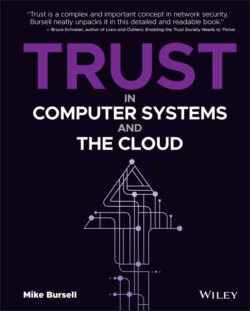Читать книгу Trust in Computer Systems and the Cloud - Mike Bursell - Страница 27
Who Is Actually Being Trusted?
ОглавлениеThe main problem with discussions around institutional trust is that although they use similar terms to those we use around individual human-to-human trust, they are all about conglomerations of trust relationships or about second-order derivations such as reputation. Economists are well aware that it is difficult to extrapolate from the theoretically rational individual actors modelled in game theory to multiple actors, particularly when neither the institution being trusted nor the context(s) for that trust relationship tend to be well-defined. Consider, for example, the phrase I don't trust the government and what different overtones that may hold when uttered by a single parent in their twenties and a multi-millionaire venture capitalist in their sixties. What do they trust the government to do or not to do, and what do they mean by the government? We are even further hampered by the geographical and jurisdictional differences. What I might mean by the government, writing this in the United Kingdom, is likely to be different to what is meant by a person of similar background in the US, Singapore, or Kazakhstan: even granted that we are talking about different bodies, the functions of those governments, their responsibilities to us, and our expectations of them are likely to be radically different.
Although it can cause confusion around the definition of party and of context, this territoriality—the connection to a particular territory or locality—as Axelrod25 calls it, provides some help when trying to define trust relationships and derive reputation, as it forces repeated interactions with known and easily recognised individuals. What is interesting about this is that Axelrod is pointing out the fact that institutions are represented by actual people who act as agents for the institution, as we noted in our discussion of our second case in Chapter 1.
Not all institutions are central authorities—although central or state banks exist, many institutions do not fit into either category—but one development that has been particularly significant is the rise in what Coleman26 identifies as explicitly social contracts with multiple corporate actors, over and beyond those with, and sometimes to the detriment of, the structural authorities that Hobbes described. Given that Coleman was writing in the mid-1980s, much of his forecast seems extremely prescient. From the move (in much of the world) from the support of party political manifestos to a much more issue-led political activism (the example du jour being Extinction Rebellion), to the astonishing power of search engines and social media sites, most of us maintain many more trust relationships to institutions in many more contexts than we would have done even 10 or 20 years ago. Nor does this disallow the possibility of some of those being state actors even outside our territory: the government of Estonia, for instance, has started offering e-residency27 for those who are not existing citizens, with a variety of mainly digital services attached. Of course, such non-territorial or extra-territorial authorities have existed for centuries—examples being the Roman Catholic Church, CND (the Campaign for Nuclear Disarmament), and Communist International (Comintern or the Third International)—though often, association with them has carried significant political risk for those involved.
